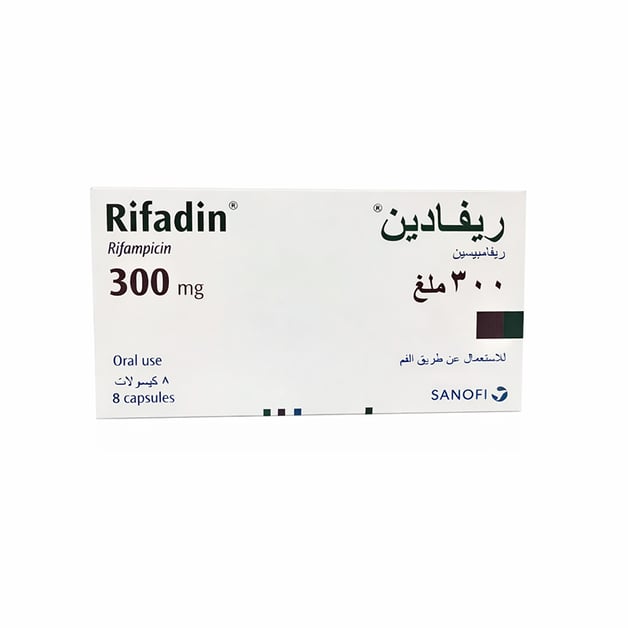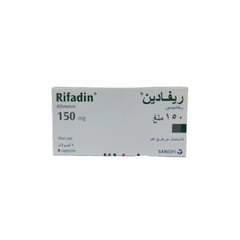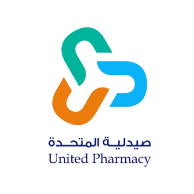Need Physician?Approval
Rifadin 300 mg 8 Capsules
64.45

In stock
SKU :
1008-HO040
A valid medical prescription is required to dispense this medication
an antibiotic that can kill various types of harmful bacteria, especially those that cause tuberculosis, an infectious disease that normally attacks the lungs.
Rifadin can be used along with other antibiotics or other drugs such as chemotherapy agents.
1. What this product is and what it is used for
Rifadin contains rifampicin, an antibiotic that can kill various types of harmful bacteria, especially those that cause tuberculosis, an infectious disease that normally attacks the lungs.
Rifadin can be used along with other antibiotics or other drugs such as chemotherapy agents.
2. What you need to know before you use this product
Contraindications:
Do not use Rifadin:
• if you are allergic to the active substance or any of the other ingredients of this medicine listed in section 6;
• if you have a condition that causes yellowing of the skin and eyes (jaundice);
• if you are taking a medicine containing saquinavir or ritonavir, medicines used to treat HIV infection, the virus that causes AIDS (see section “Other medicines and Rifadin”).
Warnings and precautions
Talk to your doctor or pharmacist before taking Rifadin if:
• you have liver problems;
• you have porphyria (a rare hereditary blood metabolism disorder);
• you are malnourished or elderly, or if the medicine is to be taken by a young child, particularly if another antibiotic called isoniazid is being taken at the same time.
• you have bleeding disorders or bruise easily (as this medicine can cause blood clotting disorders);
• you are taking other antibiotics (as certain antibiotics can increase the risk of blood clotting disorders);
If you are not sure whether any of the above apply to you, talk to your doctor or pharmacist before taking Rifadin.
It is important that the cause of your infection, and potentially a tuberculosis diagnosis, be confirmed before beginning treatment with this medicine, otherwise your treatment might not work properly and your condition may worsen.
This medicine may cause a drug reaction (DRESS syndrome) resulting in skin redness, fever, inflammation of internal organs, changes in your blood and systemic diseases.
If any of these symptoms occur, stop taking the medicine and contact your doctor as soon as possible. He or she will evaluate whether to stop your treatment.
This medicine may cause serious skin reactions. If you notice any changes to your skin (e.g. ulcers in your mouth, throat, nose, or genitals, extensive blisters or peeling), red, swollen eyes (Stevens-Johnson Syndrome - SJS), serious generalized skin damage with detachment of the epidermis and upper mucous membranes (toxic epidermal necrolysis - TEN), or red, flaky skin rash with pustules and blisters (acute generalized exanthematous pustulosis - AGEP), stop the treatment and contact your doctor as soon as possible.
Taking this medicine at the same time as other medicines may make them less effective. If you are taking Rifadin, always tell your doctor before taking any other medicine (see section “Other medicines and Rifadin”).
This medicine can cause a change in coloration (yellow, orange, red, brown) of the teeth, urine, sweat, phlegm, and tears, and may permanently stain soft contact lenses.
Laboratory tests
Your doctor will prescribe some blood tests before you take this medicine. In addition, your doctor will see you every month during treatment.
Other medicines and Rifadin
Tell your doctor or pharmacist if you are taking, have recently taken or might take any other medicines.
• You should not use Rifadin if you are simultaneously taking medicines containing saquinavir/ritonavir (used to treat HIV infection), halothane (an anesthetic), or daclatasvir, simpeprevir, sofosbuvir and telaprevir (used to treat hepatitis C, a liver infection caused by a virus).
• You should not use Rifadin at the same time as other antibiotics which cause blood clotting problems (e.g. cefazolin) as this can cause serious, sometimes fatal, blood clotting disorders, If you have to take both medicines, your doctor will monitor you, particularly for your blood.
In particular, tell your doctor if you are taking any of the following medicines as your dose might have to be adjusted:
• medicines to treat seizures or epilepsy (for example phenytoin);
• medicines to control heartbeat problems (for example disopyramide, mexiletine, quinidine, propafenone, tocainide);
• medicines to treat some types of cancer (for example tamoxifen, toremifene, irinotecan);
• medicines to treat depression and other nervous system disorders (for example nortriptyline, haloperidol);
• medicines to prevent blood clots (for example warfarin);
• medicines to treat fungal infections (for example fluconazole, itraconazole, ketoconazole);
• medicines to treat HIV infections (for example zidovudine, saquinavir, indinavir, efavirenz);
• medicines to treat anxiety and sleep disorders (for example zopiclone, zolpidem, benzodiazepines in general, such as diazepam, barbiturates);
• medicines to treat high blood pressure or other heart problems (for example enalapril, losartan, diltiazem, nifedipine, verapamil and cardiac glycosides and medicines known as beta-blockers);
• antibiotics (for example fluoroquinolones such as telithromycin, quinine, dapsone, doxycycline, chloramphenicol, clarithromycin);
• anti-inflammatory medicines, such as cortisone;
• medicines to lower cholesterol (for example clofibrate, statins);
• medicines containing hormones (for example gestrinone, oral contraceptives such as the pill, estrogens and progestogens);
• medicines to lower the body’s immune response (for example tacrolimus, ciclosporin);
• medicines to treat diabetes (for example sulfonylureas, thiazolidinediones in general, such as rosiglitazone);
• a thyroid medicine (levothyroxine);
• drugs used to treat pain (for example oxycodone, morphine) or to treat drug addiction (for example methadone);
• medicines to treat parasitic infections (for example praziquantel, atovaquone);
• a medicine used in amyotrophic lateral sclerosis (riluzole);
• medicines to treat nausea and vomiting, such as ondansetron;
• a medicine to treat breathing disorders (theophylline).
Take special care if you are taking:
• antacids: take Rifadin at least 1 hour before taking antacids;
• oral contraceptives: to avoid an unwanted pregnancy, you should switch to a different type of contraception, using a reliable barrier method such as condoms or an IUD (intrauterine device), as Rifadin makes the contraceptive pill less effective;
• isoniazid: use in combination with rifampicin may increase the risk of liver problems, for which your doctor may order periodic blood tests;
• para-aminosalicylic acid and Rifadin must be taken at an interval of at least 8 hours (para-aminosalicylic acid is an antibiotic).
Diagnostic tests
Rifadin may affect the results of some diagnostic and laboratory tests. Tell your doctor if you are having any medical or laboratory tests, particularly:
• tests to measure vitamin B12 or folate concentrations in the blood;
• gallbladder tests;
• urine tests to determine the presence of opiates.
Increased values in certain liver function tests, such as bilirubin and transaminases, may be detected, particularly in the first few days of treatment. Your doctor will decide whether these need to be checked.
Pregnancy, breast-feeding and fertility
If you are pregnant, think you may be pregnant or are planning to have a baby or if you are breast-feeding, you should only use this medicine if your doctor considers it necessary and you are under medical supervision.
Driving and using machines
Rifadin may cause some undesirable effects (such as dizziness, drop in blood pressure, headache) which may reduce your ability to concentrate and perform certain activities that require attention. If this happens to you, do not drive or use machines.
3. How to use this product.
Always take this medicine exactly as your doctor or pharmacist has instructed you. Check with your doctor or pharmacist if you are not sure.
Adults
Treatment of tuberculosis
The recommended dose taken once daily is:
- for patients weighing more than 50 kg: 600 mg per day;
- for patients weighing less than 50 kg: 450 mg per day.
Treatment of infections other than tuberculosis
The recommended dose may be increased to 900 - 1200 mg, divided into two daily doses.
Use in children
The recommended dose is 10 mg - 20 mg per kg body weight divided into two equal daily doses.
The daily dose must not exceed 600 mg.
How to use
Rifadin must be taken on an empty stomach, without food, at least 30 minutes before or 2 hours after a meal.
For the first three months of treatment, your doctor may have you take Rifadin along with two other drugs for tuberculosis, including isoniazid, which may be continued along with rifampicin for the entire length of your treatment. Treatment normally continues for 9 months.
If you take more Rifadin than you should
If you take more than the prescribed dose of Rifadin, contact your doctor immediately or go to the nearest hospital. Take the medicine pack with you. This is so the doctor knows what you have taken.
Some of the symptoms of overdose may be: nausea, vomiting, stomach pain, hives, headache, sleepiness, loss of consciousness (in the event of serious liver disease), generally temporary increase in bilirubin and other liver test results (hepatic enzymes). Other symptoms include: reddish-brown or orange coloration of skin, urine, sweat, saliva, tears and stools; the intensity of the color is proportional to the dose taken. Children may experience swollen face, eyes or eyelids. More rarely, the following may occur: drop in blood pressure, fast and/or uneven heartbeat, seizures, and cardiac arrest.
If you forget to take Rifadin
Do not take a double dose to make up for a forgotten dose.
If you stop taking Rifadin
Do not stop taking your treatment without talking to a doctor, as suddenly stopping treatment can cause allergic reactions (anaphylactic shock); see section 4.
If you have any further questions on the use of this medicine, ask your doctor or pharmacist.
4. Possible side effects
Like all medicines, this medicine can cause side effects, although not everybody gets them.
If you develop any of the following side effects, stop taking the medicine and immediately tell your doctor:
• skin problems, swallowing or breathing problems, shortness of breath, swelling of the lips, face, throat or tongue. These may be symptoms of anaphylactic shock (a serious allergic reaction);
• skin changes (e.g. ulcers in your mouth, throat, nose or genitals, extensive blistering or peeling), conjunctivitis (red, swollen eyes). These may be symptoms of a serious skin reaction called “Stevens-Johnson Syndrome” – SJS;
• serious generalized skin damage (detachment of the epidermis and upper mucous membranes) (toxic epidermal necrolysis – TEN);
• red, flaky skin rash with pustules and blisters (acute generalized exanthematous pustulosis):
• a drug reaction resulting in skin redness, fever, inflammation of internal organs, changes in your blood and systemic diseases (DRESS syndrome);
• inflammation of the small blood vessels of the skin which leads to a purplish-red rash, called “purpura”. The medicine may cause a reduction in the number of certain blood cells called platelets (thrombocytopenia, which may affect up to 1 in 10 patients), which can lead to this abnormal collection of blood under the skin. This condition generally resolves when treatment is stopped. However, it can also worsen, causing bleeding in the brain and death if treatment is not stopped or if it is resumed after the development of “purpura”.
The following side effects have also been reported with the use of this medicine:
Very common side effects (may affect more than 1 in 10 patients):
• fever, chills.
Common side effects (may affect up to 1 in 10 patients):
• headache, dizziness;
• nausea, vomiting;
• increase in blood bilirubin (hyperbilirubinemia);
• changes in certain liver function test results (increase in aspartate aminotransferase; increase in alanine aminotransferase).
Uncommon side effects (may affect up to 1 in 100 patients):
• certain blood changes (leucopenia);
• diarrhea.
Side effects of unknown frequency:
• painful inflammation of the colon (the last part of the intestine) involving cramps, continuous diarrhea, weakness and fever (pseudomembranous colitis);
• certain blood changes (agranulocytosis, eosinophilia, leukopenia, anemia);
• blood clotting disorders (vitamin K dependent);
• bleeding;
• inflammation of the liver (hepatitis);
• decreased appetite (anorexia);
• stomach and intestinal disorders, abdominal discomfort;
• redness and other skin disorders, with pruritus, hives;
• muscle weakness, muscle diseases (myopathies);
• bleeding after birth (in both mother and fetus);
• menstrual cycle disorders;
• fluid retention with subsequent swelling (edema);
• change in color of tears, phlegm, sweat or urine;
• change in color of the teeth (which can be permanent);
• porphyria attacks in patients already affected by this disease (a rare hereditary blood metabolism disorder);
• changes in certain liver function test results (increase in hepatic enzymes, increase in alkaline phosphatase);
• increased blood creatinine levels (creatinine indicates the level of kidney function);
• flu with bone pain and general discomfort;
• breathing difficulties (dyspnea) and wheezing;
• drop in blood pressure;
• drop in blood pressure with resulting impairment of consciousness and other mental faculties (shock);
• flushing;
• acute kidney damage due to development of kidney diseases (e.g. renal tubular necrosis or tubulointerstitial nephritis);
• a rare condition that affects the skin and mucous membranes involving the development of blisters on the skin (pemphigus);
• a serious disease involving the formation of diffuse blood clots (disseminated intravascular coagulation);
• mental disorders;
• impaired adrenal function in patients who already have adrenal problems;
• inflammation of the blood vessels causing skin problems, weakness, fever, joint and muscle pains (vasculitis).
To report any side effect(s):
• Saudi Arabia:
- The National Pharmacovigilance and Drug Safety Centre (NPC)
• SFDA call center : 19999
• E-mail: [email protected]
• Website: https://ade.sfda.gov.sa/
• Sanofi- Pharmacovigilance: [email protected]
5. How to store this product
KEEP THIS MEDICINE OUT OF THE SIGHT AND REACH OF CHILDREN.
Do not store above 30°C.
Do not use this medicine after the expiry date which is stated on the carton and blister after EXP. The expiry date refers to the last day of that month.
Do not throw away any medicines via wastewater or household waste. Ask your pharmacist how to throw away medicines you no longer use. These measures will help protect the environment.
| Offer Label | Need Physician?Approval |
|---|---|
| Shipping Type | Express |
Write Your Own Review
The largest selection of casino games and sports bets at 1xbet app.




